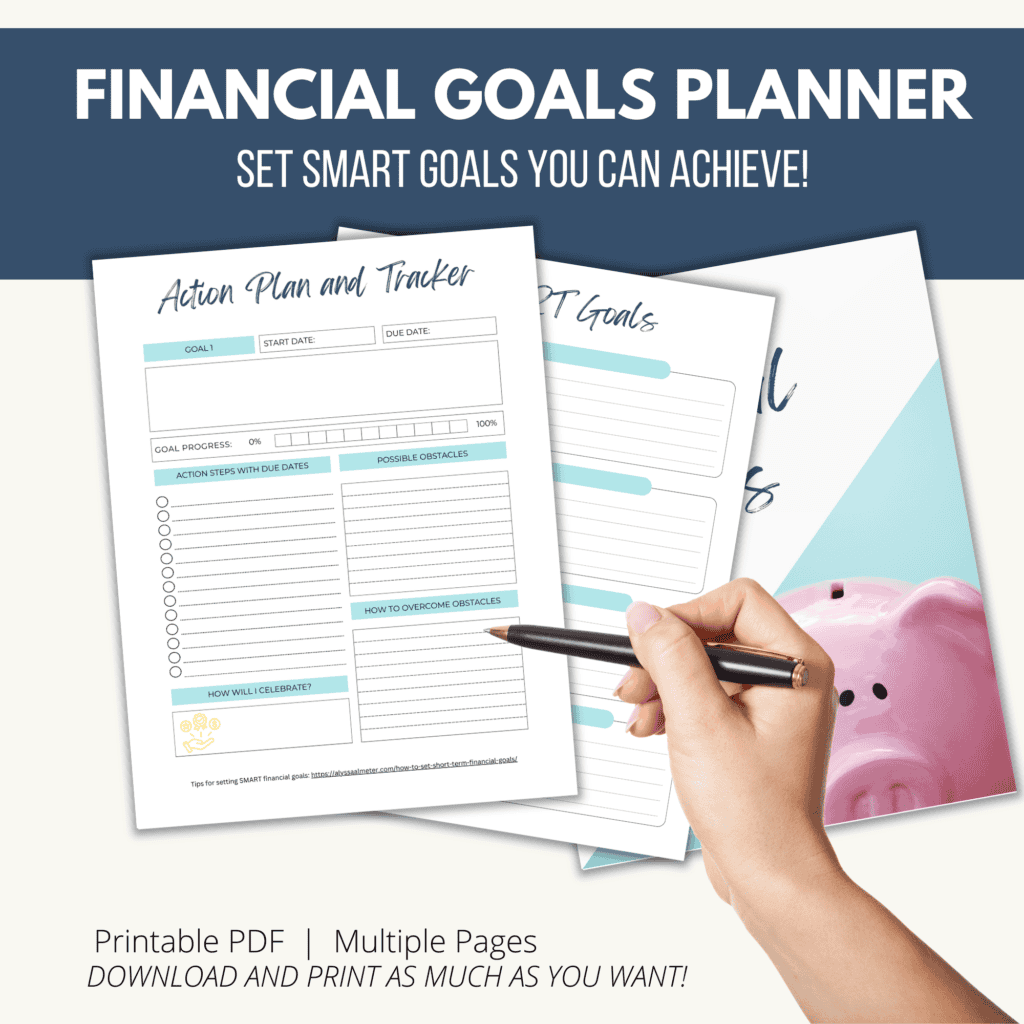This post may contain affiliate links. As an Amazon Associate I may earn from qualifying purchases at no additional costs to you. Please see the Policies pages for more info.
Year-End Financial Checklist: Prepare for a Strong Start
As the year draws to a close, using a year-end financial checklist is the perfect way to evaluate your financial progress and prepare for the year ahead. An end of year financial review helps you celebrate your wins, identify areas for improvement, and set meaningful goals for the future.
Whether you’re evaluating your budget, checking off financial milestones, or planning for tax season, this process ensures you’re starting the new year with clarity and confidence!
In this post, I’ll walk through key steps to review your finances and actionable strategies to make 2025 your best financial year yet.
Review Your Financial Goals
Before you begin making money goals for the New Year, you first have to see how well you did with this year’s goals. Evaluate how well you met your financial goals for the year.
What goals did you make this year? Did you reach those goals?
Celebrate any goals that you have accomplished and any progress made (the small wins).
If you did not reach your goals or didn’t make any goals, use this time as an opportunity to learn how you can do better next year.
Action Step:
Journal the following questions.
- Did I achieve the financial goals I set for this year? Why or why not?
- Were my goals realistic and aligned with my income, expenses, and lifestyle?
- What obstacles did I face in reaching my goals, and how can I overcome them next year?
- How much progress did I make toward my savings goals or debt repayment plan?
Conduct a Budget Review
Review your budget for the last 12 months and make note of your spending patterns. This will be a lot easier to do if you have been diligently tracking each month.
If you haven’t tracked your spending, you can still do this by looking back at your bank or credit card statements for each month.
You don’t have to spend time on every little detail here. That will take a lot of time and become overwhelming.
The idea of this exercise is self awareness, not perfectionism. Review your spending without judgment.
Action Step:
- Do a quick overview of your monthly budget.
Here are some questions to journal about:
- Did I stay within my budget for most categories, or were there frequent overspending patterns?
- What were some larger spending months and why? (Vacations, birthdays, car repairs, etc.)
- What unexpected expenses arose, and how well did I handle them?
- Are there recurring expenses or subscriptions I can cut or reduce for next year?
- What financial habits worked well for me, and which ones need improvement?
Maximize Retirement Contributions
Reviewing and maximizing your retirement contributions at the end of the year is a smart financial move that can set you up for long-term success. Start by checking how much you’ve contributed to your retirement accounts, like a 401(k) or IRA, compared to the annual limit.
For 2024, the contribution limit for 401(k)s is $23,000 and IRA is $7,000. If you haven’t met those limits and have some extra money to spend then you can add that before the end of the year to take full advantage of your retirement savings.
Action Steps:
- Review your retirement accounts and make additional contributions if you are able. Contact a financial advisor if you’re not sure how to do this.

Evaluate Investment Portfolio
Evaluating your investment portfolio at year-end is an important step in ensuring your financial strategy aligns with your goals. Start by reviewing the performance of your investments over the past year.
Are they meeting your expectations? If not, consider whether adjustments are needed.
This is also a good time to reassess your overall investment strategy and make changes to stay on track for long-term success.
Action Step:
- Review your current investments and determine if you want to make adjustments for the following year.
- Contact a financial advisor if you need help with this.
Review and Adjust Insurance Coverage
If you haven’t reviewed your insurance coverage lately then the end of the year is a good time to do it. Review your insurance policies, including health, auto, and home insurance, to ensure adequate coverage.
Action Steps:
- Read Essential Insurance: 6 Policies Everyone Should Have to learn what types of coverage is necessary to protect your financial health.
- Contact your insurance providers to update or adjust your policies as needed.
Plan for Flexible Spending Accounts (FSAs)
Flexible Spending Accounts (FSA’s) are one type of savings account to be used for medical expenses. If you have a FSA then you have to use the funds in your account by the end of the year or you lose that money (your money).
Action Step:
- Check your FSA balance.
- Pay any outstanding medical bills with your FSA money.
- If you still have money in your FSA after all bills are paid, make a plan to use up that money. This is a great time to stock up on items like medicines and bandages. An easy way to do this and make sure your purchases are eligible is to shop at the FSA Store.

Prepare for Year-End Financial Reports
January is the start of tax season and the more organized you are with your documents, the easier it will be.
You won’t have everything you need by the end of the year since W-2’s and other documents aren’t available until the end of January. But you can get started with what you do have and make sure everything is ready to go and in one place.
Action Step:
- Collect all necessary financial documents for tax preparation and financial review.
- Organize and review your documents to ensure accuracy and completeness. Put them all into 1 file folder that is marked for that tax year.
Review Debt and Credit Report
Assess your current debt situation by listing all your current debts including auto loans, credit cards, student loans, personal loans, HELOC, mortgage, etc.
Also check our credit report for accuracy.
What debts do you want to pay off in the upcoming year?
Action Steps:
- Check your credit report on CreditReport.com. Review it for accuracy, making sure there aren’t any debts that someone else took out in your name.
- Make a list of all your small debts (everything except the mortgage) from smallest balance to largest balance. Include minimum monthly payment and interest rate.
Set Financial Goals for the New Year
Once you have reviewed your budget and financial goals for the past year, you are ready to set financial goals for the upcoming year.
There are 4 types of short-term goals you can set for the year ahead:
- Giving Goals
- Income Goals
- Savings Goals
- Debt Payoff Goals
Ask yourself, do my financial goals for next year reflect my current priorities and long-term aspirations?
Action Step:
- Download the Financial Goals Planner to help you map out your goals for the upcoming year as well as the action steps to take to achieve those goals.

Conclusion
Taking the time to review your finances at the end of the year is a powerful way to reflect on your progress and set the stage for success. By evaluating your goals, spending habits, investments, and savings, you can make informed decisions to improve your financial health.
Use this opportunity to celebrate your wins, learn from challenges, and set clear, achievable goals for the new year.
But also give yourself some grace! You do not have to complete all these things by December 31! There is a lot here.
Take 1 – 2 things you can work on at a time. Download this free PDF as handy guide for your year-end financial checklist. Most of the key areas are listed so you can work on them throughout the year and grow your financial confidence with each one you check off!
Related Articles to Help You with Your Year-End Financial Checklist
Make a Budget: 5 Simple Steps to Get Started
How to Set Financial Goals You Can Achieve
The Best Budgeting App to Manage Your Money


